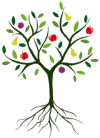Orleans Reinette
Orleans Reinette is an old French late-season apple variety, first recorded in the 18th century. It is very different from modern apples, being firm rather than crisp to the bite.
However it has remained quietly popular in both Europe and North America on account of its rich old-fashioned flavour.
Orleans Reinette apple trees for sale
1-year bare-root
tree
on MM106 rootstock£34.95
Mature height: 3m-5m after 10 years
Can be trained on as a large free-standing apple tree, a half-standard apple tree, a large apple fan or espalier, or a pleached apple tree. Available next season
Growing and Training
Orleans Reinette is a fairly light cropper and grows best in areas with drier climates.
Flowering occurs over a longer period than other apple varieties, which makes it difficult to assign Orleans Reinette to a specific flowering group, but it basically flowers in the mid/late blossom season and will therefore be pollinated by most other apple varieties.
Recommended pollinators for Orleans Reinette apple trees
Orleans Reinette is not self-fertile and is also a poor pollinator of other varieties. Ideally you need two other different but compatible varieties planted nearby in order to produce fruit, or one compatible self-fertile variety.
The following varieties are good pollinators for Orleans Reinette.
If you are not sure about pollination requirements don't hesitate to ask us.
Ellison's OrangeEllison's Orange is a well respected Cox-style apple which can achieve very good flavour.
GalaGala is popular supermarket apple - but better when home-grown, with a sweet pleasant flavour.
BraeburnBraeburn is one of the best-flavoured supermarket apple varieties.
Newton WonderA traditional English cooking apple, a good alternative to Bramley.
King of the PippinsA popular and versatile dual-purpose apple, widely grown in the Victorian era.
John DownieJohn Downie is a traditional crab apple for making crab apple jelly. White blossom and orange-red fruits.
Peasgood's NonsuchPeasgood Nonsuch is a highly-regarded old-fashioned English cooking apple.
Golden GemA traditional crab-apple featuring a mass of white blossom in spring, followed by yellow crab apples.
History
Orleans Reinette originates from France in the 18th century.
Orleans Reinette characteristics
- Gardening skillAverage
- Fruit persistenceNormal ripening
- Self-fertile?Not self-fertile
- Pollinating othersPoor
- Pick seasonLate
- Picking periodmid-October
- Keeping2-3 weeks
- Food usesEating freshCulinary
- Country of originFrance
- Period of origin1750 - 1799
- Fruit colourOrange flush
You might also like these varieties
Ashmead's KernelA versatile English 17th century russet apple, Ashmead's Kernel is noted for its distinctive pear-like flavour.
King of the PippinsA popular and versatile dual-purpose apple, widely grown in the Victorian era.
Pitmaston Pine AppleA small English 18th century apple with a distinctive fruity pineapple-like flavour.
Yellow IngestrieOne of the prettiest of all apples, perfect for a table display, with a rich fruity flavour.
More about apple trees
Apples are very versatile, and all varieties can be eaten or used in the kitchen. However varieties specifically grown as eating apples tend to have the best flavours for eating raw.
The main thing to decide when choosing an eating apple is when you intend to eat the apples. Early season apples are typically ready in August, and generally don't keep very long. Mid-season apples are ripe in early September, while late-season apples start to become ripe in late September and October. Many of the late-season varieties can also be stored in a fridge or cold shed for several months into the winter.
Some apple varieties are self-fertile, but most are not. However in most areas of the UK you do not need to worry whether your apple trees are self-fertile or not, as there will be other apple trees in nearby gardens to help with pollination.
